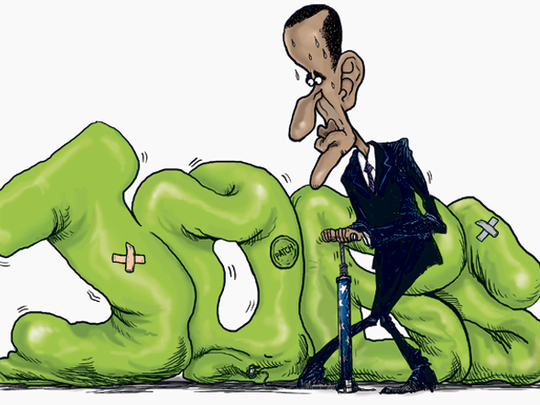
It is hard to be optimistic about America at present. With the help of crucial government support in the crisis, the US financial sector (or at least parts of it) has bounced back, while America's real economy struggles with high unemployment, discouraged labour-force dropouts, and damaged balance sheets.
So it is no surprise that the American public and the US Congress are angry. The focus of that anger has been the massive and unwise financial-sector bonuses. As a result, regulatory reforms have thus far consisted of, first, a threat to the Federal Reserve's autonomy, and, second, a tax on bonuses.
The first idea is a bad one. The latter may be politically mandatory and marginally beneficial in fiscal terms. Its effects on risk-taking are debatable. But the much-needed structural reforms to limit leverage and contain the risks that the financial system periodically imposes on the real economy — and the public purse — have only belatedly gotten off the to-do list, and the prospects of enacting them are difficult to estimate.
In fairness, the new rule proposed by former US Federal Reserve chairman Paul Volcker to separate financial intermediation from proprietary trading is not a bad idea. Combined with elevated capital requirements for banks, it would reduce the chance of another simultaneous failure of all credit channels.
But it is not sufficient. Hedge funds can also destabilise the system, as the collapse of Long Term Capital Management in 1998 demonstrated. So they also need clear, albeit different, limits on leverage.
Misplaced priorities
One might expect that after a dangerous crisis rooted in growing structural imbalances and an unsustainable growth pattern on the demand side, there would be serious, ongoing debate about what is needed to restore long-term growth and productive job creation in the context of a rapidly evolving global economy.
But there is not, which is both puzzling and worrisome.
This is not to say that the US economy has lost its dynamism. Far from it. But in the long term, sustaining it will require far-sighted public policies and investments in hard and soft infrastructure to support the private sector's high capacity for innovation.
There are those who disagree and believe that an economy's dynamism is found almost entirely in the private sector, while the task of government is mainly to stay out of the way. Still others accept that government could in principle do something useful, but believe that it normally does not, and that the risks outweigh the benefits.
A policy agenda in the US that is overloaded, overwhelmingly domestically focused, and partially paralysed will mean a lack of attention to global issues that require cooperation and compromise.
In the absence of coordination, there is also a risk that monetary policies designed to promote growth (or at least not impede it) will lead to a return of financial sector distortions and imbalances.
The rebalancing and restoration of global demand in the medium term is discussed within the G20, but has not really gotten underway.
From the perspectives of both policy and investment, the short and medium term is once again risky. Many countries, including developing ones, will adopt defensive postures, some of which, such as making better use of the domestic market as a driver of growth, will have broadly positive impacts, even if growth prospects are somewhat diminished in the aggregate.
More importantly, the crisis highlighted the risks associated with high dependence on foreign capital. That, combined with slow progress on financial sector reform, makes it likely that risk-aversion will prevail, which could slow, if not reverse, financial globalisation, and probably lead to slower growth in many countries.
Restarting the Doha round of trade negotiations with a more manageable agenda — and one focused on the poorer and more vulnerable developing countries — would be a good way to revive progress on trade.
But, in an environment of slow growth and high unemployment, sentiment in the advanced countries regarding efforts to liberalise trade is distinctly negative.
Foundation
The restoration of growth and balance in the US economy is crucially important, not only for its effect on global growth, but also as a foundation for tackling a broad array of international problems and challenges. Right now, it looks as though creating that foundation is on hold.
Outside the advanced countries, there is a view that the world will return to pre-crisis conditions, with a stable US that functions as borrower, lender, and consumer of last resort. What this perspective ignores is that pre-crisis growth in the US and the global economy was based in part on an unsustainable configuration.
Returning to that model is neither likely nor wise. While a relatively high and sustainable growth pattern can be achieved, it will take time. And it will occur (if it does) in a global economy with fundamentally different structural and regulatory characteristics.
Waiting around for the advanced countries to right their ships so that we can all go back to the old normal is neither good policy nor a good bet.
What is needed is coordinated restructuring and policy setting. That is hard to do when the US, the largest fiscally unified economy, is focused elsewhere.
Michael Spence is the 2001 Nobel Laureate in Economics, and Professor Emeritus, Stanford University. He chairs the Commission on Growth and Development.












